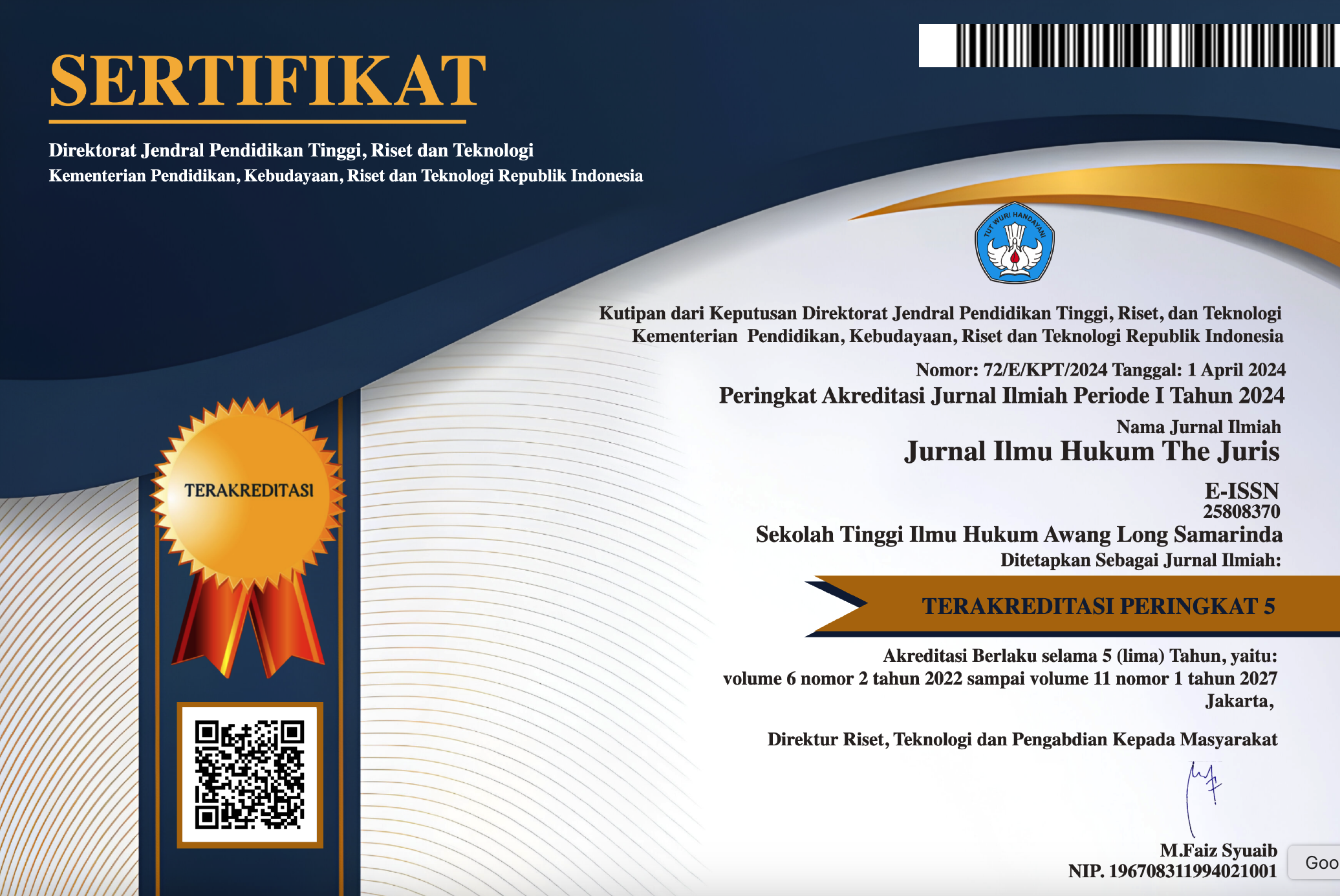TINDAK PIDANA KORUPSI PROYEK EMBUNG MNELALETE KECAMATAN AMANUBAN BARAT KABUPATEN TIMOR TENGAH SELATAN PROVINSI NUSA TENGGARA
Abstract
Corruption is an irresponsible act that causes harm to the nation, the state, and society. The rampant occurrence of corruption in Indonesia is caused by various factors, one of which is the gap between the laws and regulations and the practices that occur in court. This gap ultimately makes perpetrators feel relatively safe when committing acts of corruption. In the case of Jemmy Unbanunaek, there was a discrepancy between the laws and the judge’s decision, as Jemmy was not a civil servant but was charged under Article 3 of the Corruption Eradication Act (UUTPK), which applies to civil servants. This indicates that the judge did not properly consider the legal status of the perpetrator. The type of research used in this study is normative juridical legal research. Normative juridical legal research is conducted using a document study approach, which involves the analysis of documents such as literature data, statutory regulations, court decisions, legal theories, and expert opinions. The technique for collecting legal materials in this research is through literature study. The research findings indicate that: (1) The judge’s legal basis in deciding the corruption case of the Mnelalete reservoir project in South Central Timor Regency was Article 3 of the Corruption Eradication Act (UUTPK). The findings show that the judge applied Article 3 of the UUTPK to prosecute Jemmy Unbanunaek. However, this application was inappropriate because Jemmy did not meet the element of official authority required by Article 3, and he was not a civil servant. (2) The verdict rendered by the judge against Jemmy was legally flawed (error in juris) and mistaken with regard to the subject of the offense (error in persona), and it contradicted the principles of criminal liability and the principle of legality. The judge should have applied Article 2 of the UUTPK, which is more appropriate given Jemmy's status and the unlawful nature of his actions.
Downloads
References
Amiruddin. (2010). Korupsi dalam pengadaan barang dan jasa. Jakarta: Genta Publishing.
Black, H. C. (1990). Black’s law dictionary. West Publishing.
Burgerlijk Wetboek voor Indonesia.
Campbell Black, H. (1990). Black’s law dictionary. West Publishing.
Darwin Prinst. (2002). Pemberantasan tindak pidana korupsi. Bandung: PT Citra Aditya Bakti.
Evi Hartanti. (2007). Tindak pidana korupsi (Edisi ke-2). Jakarta: Sinar Grafika.
Hamdan, M. (2005). Tindak pidana korupsi suap and money politics. Medan: Pustaka Bangsa Press.
Hiariej, E. O. S. (2016). Prinsip-prinsip hukum pidana. Yogyakarta: Cahaya Atma Pustaka.
Kamus Besar Bahasa Indonesia.
Koeswadji. (1995). Perkembangan macam-macam pidana dalam rangka pembangunan hukum pidana. Bandung: Citra Aditya Bhakti.
Moeljatno. (1984). Asas-asas hukum pidana. Jakarta: PT Bina Aksara.
Muladi, & Arief, B. N. (1984). Teori-teori dan kebijakan hukum pidana. Bandung: Alumni.
Mulyadi, L. (2007). Tindak pidana korupsi di Indonesia. Bandung: PT Alumni.
Mulyadi, L. (2015). Seraut wajah putusan hakim dalam hukum acara perdata Indonesia: Prespektif teoritis, praktik, teknik membuat, dan permasalahannya. Bandung: PT Citra Aditya Bakti.
Nurdjana, I. G. M. (2005). Korupsi dalam praktek bisnis: Pemberdayaan penegak hukum, program aksi dan strategi penanggulangan masalah korupsi. Jakarta: PT Gramedia Pustaka Utama.
Peraturan Presiden Nomor 70 Tahun 2012 tentang Perubahan Kedua atas Peraturan Presiden Nomor 54 Tahun 2010 tentang Pengadaan Barang/Jasa Pemerintah. Lembar Negara Republik Indonesia Nomor 363, Tambahan Lembar Negara Nomor 5318.
Putusan Pengadilan Negeri Kupang Nomor 55/Pid.Sus-TPK/2019/PN Kpg.
Putusan Pengadilan Negeri Kupang Nomor 57/Pid.Sus-TPK/2019/PN Kpg.
Rusli Muhammad. (2007). Hukum acara pidana kontemporer. Jakarta: Citra Aditya Bakti.
Undang-Undang Nomor 8 Tahun 1981 tentang Hukum Acara Pidana. Lembar Negara Nomor 76, Tambahan Lembar Negara Nomor 3209.
Undang-Undang Nomor 17 Tahun 2003 tentang Keuangan Negara. Lembar Negara Nomor 47, Tambahan Lembar Negara Nomor 4286.
Undang-Undang Nomor 20 Tahun 2001 tentang Perubahan atas Undang-Undang Nomor 31 Tahun 1999 tentang Pemberantasan Tindak Pidana Korupsi. Lembar Negara Nomor 140, Tambahan Lembar Negara Nomor 3874.
Undang-Undang Nomor 20 Tahun 2023 tentang Aparatur Sipil Negara. Lembar Negara Nomor 141, Tambahan Lembar Negara Nomor 6897.
Undang-Undang Nomor 30 Tahun 2014 tentang Administrasi Pemerintahan Pasal 1 Angka 22. Lembar Negara Nomor 292, Tambahan Lembar Negara Nomor 5601.
Undang-Undang Nomor 31 Tahun 1999 tentang Pemberantasan Tindak Pidana Korupsi.
Undang-Undang Nomor 48 Tahun 2009 tentang Kekuasaan Kehakiman. Lembar Negara Nomor 157, Tambahan Lembar Negara Nomor 5075.
Undang-Undang Nomor 73 Tahun 1958 tentang Kitab Undang-Undang Hukum Pidana.
Wiyono, R. (2009). Pembahas Undang-Undang Pemberantasan Tindak Pidana Korupsi. Jakarta: Sinar Grafika.
Wiyono, R., S.H. (1974). Tindak pidana korupsi di Indonesia. Bandung: Offset Alumni.
Copyright (c) 2025 Syarah Dyana Oematan, Debi. F. Ng Fallo, Orpa G. Manuain

This work is licensed under a Creative Commons Attribution-ShareAlike 4.0 International License.







